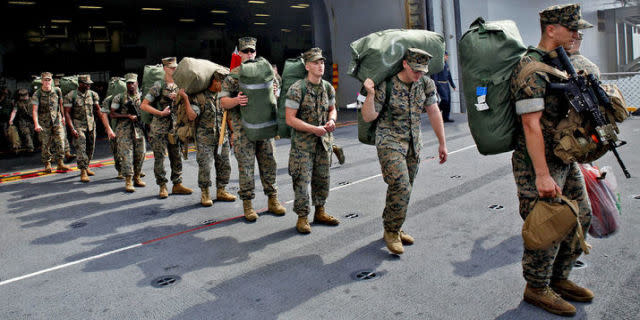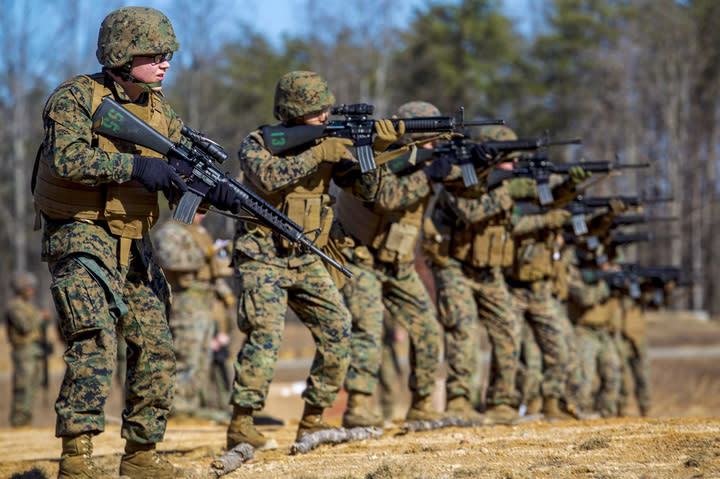What We Need to Consider Before Jumping into Another Ground War

"God is not mocked: for whatsoever a man soweth, that shall he also reap."
-Paul to the Galatians 6:7
Here's the thing about karma and military affairs: The bad karma does not always accrue to those who deserve it, nor are its effects always easy to spot. Indeed, sometimes they can be diluted and subtle. We are facing one of those situations right now, when decisions made by the men at the apex of power come home to roost, landing not on those who made the decisions, but on those still in uniform today, and those who will be in uniform for years and years to come, decades after the decision makers are well and gone. And the next time we find ourselves in a ground war, be it in Syria or North Korea or wherever, we will be something less than we could be. We will start to see, in diverse ways, the drain on morale, effectiveness, human potential, and a host of other factors contributing to military utility from decisions made a long time ago. And that costs lives in the end.
Fourteen years ago, I listened to Secretary of Defense Donald Rumsfeld respond to a question about the possibility of increasing the size of the Army in light of what had developed into two simultaneous land wars. Rumsfeld's response was dismissive and negative. I'm paraphrasing here, but it was something along the lines of: Don't be ridiculous. It takes two years to recruit, train, and integrate a soldier into a unit to the level where he is useful. We won't need that increase in two years…
We will start to see the drain on morale, effectiveness, human potential, and a host of other factors.
I remember sitting in my cubicle in the Five-Sided Funny Farm, banging my head against the surface of my desk. Two years after that day, in Baghdad, I remember thinking, "Damn sure wish we had those men we didn't need." By 2006, the entire Army was getting pinched pretty badly, and we could all see there was more strain to come.
Sadly, the government does not have the best track record in how it responds to a drastic need for trained soldiers, even back when we had a draft. The response is almost always short-sighted, but it has long term effects.
Let me take you back to 1966, when the Department of Defense, under a businessman named Robert Strange McNamara, instituted a program called "Project 100,000." The intent of the program was to increase the overall number of men who could be inducted into the military by significantly lowering the mental and/or educational qualifications needed to enter the armed forces. On paper, the plan would bring some 100,000 more men into the military every year. The program ran from 1966 through 1971, but its effects lasted far beyond that time period.

Some 350,000-plus men were inducted into the armed forces under Project 100,000, the majority into the Army and the Marines. Forty percent were destined for the "Combat Arms" (Infantry, Armor, Artillery), whose normal distribution was only 15 percent. Men who were functionally illiterate-including those who later tested with IQs in the 60s-were now accepted by volunteer status or through the draft. Many believed that was wrong.
Some of those Project 100,000 men stayed after Vietnam, and in doing so ended up as an anchor, dragging the Armed Forces down for nearly 20 years after.
That might sound harsh, but it is also true. A private or a lance-corporal who has a very low IQ may be a problem, but he can still perform rank-appropriate tasks. But then he may become a Sergeant, and then a Staff Sergeant, and possibly even a First Sergeant. Especially in the 1970s, when pay, morale, and discipline were at rock-bottom levels, many contend that all it took was a heartbeat and a record of keeping out of trouble for you to move up the ladder, deservedly or not. Even those who did not move up did not necessarily have to "move out" (exit the military) in any sort of timely manner. Generically speaking, you could say that the Peter Principle was disproven as men advanced not just one rung above their level of competence, but entire flights.
We were feeling that effect into the 1980s, and there is no good way to tell what the overall impact has been-wasted time, wasted U.S. resources, wasted military equipment and supplies.
Men advanced not just one rung above their level of competence, but entire flights.
Back to Iraq.
In 2006, as I watched the Army begin to lower, then lower again, the enlistment standards, I thought of Project 100,000. It drained units as men promoted by seniority, not ability, stayed on, and units had to train, and retrain, and retrain again, because the overall intellectual capacity was lacking in too many key nodes. I wondered what the effect of this new generation of lower standards-both physically and mentally, as well as for people with criminal records-might be.
The recruiting crisis for the Army and the Marine Corps lasted from roughly 2006 to 2010. As the main phase of the Iraq War wound down and the demand for more troops abated, the recruiting standards went back up. But it is just about now, as international tensions flair, that we will start seeing the effects of those lowered standards from the 2010s taking root again.
The problem? Well, even when we spot the broader trends, my guess is that there will not be a whole lot we can do about it, from within or without the armed forces. We are, once again, stuck with the long-term effects of short-sighted answers.
It is almost like we are incapable of learning from our own history.
Robert Bateman is a fellow at New America, a veteran of a few decades in uniform, and a regular contributor to Esquire.com. As always he may be reached at R_Bateman_LTC@hotmail.com.
Respond to this post on the Esquire Politics Facebook page.
You Might Also Like

